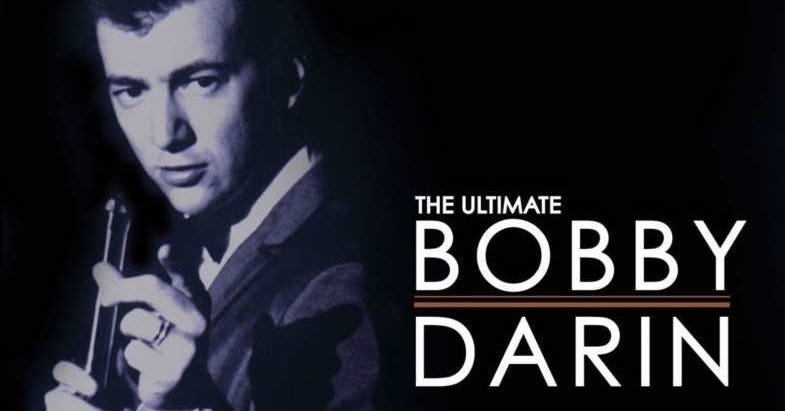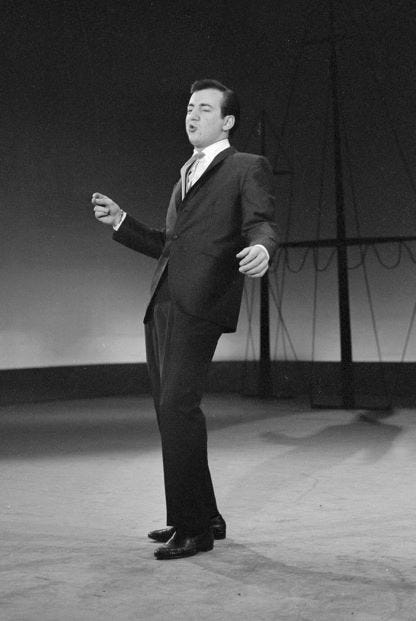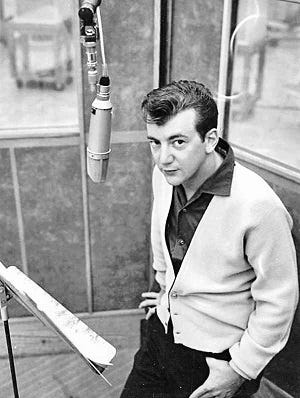Ella Fitzgerald’s 1960 live album “Ella in Berlin” features a celebrated performance of Mack the Knife during which she forgot the lyrics and delivered a series of spontaneous -- and perfectly harmonious -- ad-libbed words with such playfulness and spirit that both the audience and Ella herself were delighted. At the peak of wild audience applause for her improvisational efforts Ella salutes the song’s hit maker excitedly exclaiming, “Thank you Bobby Darin fans.”
It’s a fandom that includes me . . . I am an enthusiastic admirer of Bobby Darin. He was a formidable talent, exceptionally gifted, a prodigy. And without question his iconic 1959 recording of Mack the Knife is one of the most memorable records of the 20th Century.
Because of his flair for big band jazz flavored pop vocals, Bobby Darin’s career is frequently examined in relation to Frank Sinatra. (And his back and forth public exchanges with Sinatra added to the comparison). It’s a comparison that is both unfair and inaccurate. Unfair because Sinatra was the kind of genius interpretive artist that only comes along every hundred years or so; inaccurate because Darin was neither a Sinatra “wannabe” nor a Sinatra clone.
They belong to different periods of time and both their styles and their careers were molded by very different influences. Sinatra is a product of the big band era, Tommy Dorsey and Bing Crosby, and Darin was shaped by the early rock and roll years, Elvis and Ray Charles and Fats Domino.
Bobby Darin was a transformative talent with a reckless magnetic quality and vast emotional depth. He was certainly influenced by Sinatra and schooled himself in the tradition of big band swing, but more than just an influence, I argue, Sinatra was for Darin a guiding spirit. Sinatra offered Darin a blueprint for success.
Like Sinatra, Bobby Darin was wonderfully unpredictable, never dull and never safe -- from Splish Splash to Mack the Knife to If I Were a Carpenter his career is exemplified by a willingness to chase risk, having the courage to take the leap, and the grace to land on his feet.
The first of his big risks was a reworking of The Ballad of Mack the Knife from Bertolt Brecht and Kurt Weill’s “The Threepenny Opera” into the finger-popping bravado of Mack the Knife. Arranged by Richard Wess, Darin’s engaging vocal and the swing-inspired arrangement turned the record into an instant classic cementing both Darin’s and Wess’ reputations as significant figures in modern big band swing. The recording became Darin’s signature song, forever identified with him, and earned him two Grammy Awards.
He was a simply brilliant performer. His ability to captivate audiences with a compelling energy was matchless. From the percussive finger snapping swagger of his vocals to his Elvis-like lip curl and the graceful pirouettes of his unique choreography, Bobby Darin infused every performance with electricity, setting attendance records along the way at the Copacabana nightclub in Manhattan and headlining in Las Vegas.
Darin borrowed the dramatic legato technique of singing over the bar from Sinatra (who borrowed it from Tommy Dorsey’s trombone playing). In this brief clip from a Darin Ed Sullivan Show appearance watch how Bobby seamlessly sails over the bar connecting, “like a bird on the wing” seemingly without a breath with “I’ll face the unknown.” And he repeats the legato technique later linking “all my own” seamlessly over the bar with “no one knows better” in the closing stanza. Charisma, very theatrical and delivered with elegant “cool.”
Bobby Darin was born Walden Robert Cassotto May 14, 1936 in East Harlem, New York to Vanina Juliette "Nina" Cassotto. Because his mother was barely 18 at the time of his birth, Darin was raised to believe his maternal grandmother was his mother and Nina was his older sister.
At the age of 8 Darin contracted rheumatic fever leaving him with a lasting heart defect so dire he was not expected to live long. The family moved to the Bronx where Darin graduated from the prestigious Bronx High School of Science (as did my wife). Early on he showed a strong aptitude for music and by the time he was a teenager Darin had mastered piano, drums, and guitar.
By the age of twenty he’d joined an influential group of young songwriters -- Gerry Goffin and Carole King, Neil Sedaka, Jerry Leiber and Mike Stoller, Burt Bacharach and Hal David, Barry Mann and Cynthia Weil -- who were operating out of New York City’s Brill Building. He co-wrote several songs for Connie Francis (they also had a romance), negotiated a recording contract with Decca Records, and assumed his stage name of Bobby Darin.
He left Decca to be signed by famed Atlantic Records talent scout Ahmet Ertegun. Darin's career exploded when in 1958 he co-wrote and recorded Splish Splash, a feel-good rock and roll million seller and followed it up by writing and recording a second million seller Dream Lover in 1959.
The two hits catapulted him to international stardom but Darin, not content to remain a teenage sensation and wanting to showcase his vocal range, took the audacious step of recording a jazz-infused rendition of Kurt Weill’s Mack the Knife. The recording shows him to be a master of pace, cadence and rhythm. Bobby Darin could swing . . . his buoyant syncopated rhythms are the swinging core of Mack the Knife.
Following that success Darin hit a second home run with Beyond the Sea, a reworking of Charles Trenet’s French classic La Mer, another collaboration with the brilliant young arranger/conductor Richard Wess.
In 1959 Darin released the album some argue is his finest. “That's All” features both Mack the Knife and Beyond the Sea along with a marvelous collection of jazz/pop standards including a raucous rendition of Oscar Hammerstein II and Sigmund Romberg’s Softly, As in a Morning Sunrise, Arthur Hamilton’s sensitive ballad She Needs Me and That's the Way Love Is a swinging composition of his own. With magnificent arrangements from Richard Wess, “That's All” demonstrated Bobby Darin’ chops as a big band jazz singer and catapulted him to a new level of stardom.
Darin and Wess would join forces in 1960 for another terrific album “This Is Darin” but I think the duo’s collaboration reached an artistic peak in 1964 with “From Hello Dolly to Goodbye Charlie.” It is for me a nearly perfect record, one that is on my “one record to take to desert island” list.
The title may be lame but every track is a gem. Made up of mostly songs from Broadway shows and films (thus the lame title) the album features some of Darin’s finest vocals and I cannot say enough about the Wess arrangements.
There are two songs from Jimmy Van Heusen and Sammy Cahn, the moving ballad Where Love Has Gone and Darin’s wonderful reading of Call Me Irresponsible. Two from Henry Mancini and Johnny Mercer -- a sumptuous rendition of The Days of Wine and Roses, and a lightning tempoed Charade. There’s Peter’s Nero’s lovely Sunday in New York and Riz Ortolani’s surprise hit More from the film Mondo Cane, and a rollicking delivery of André Previn and Dory Langdon’s Goodbye, Charlie. Plus two Darin co-wrote, The End of Never and Look at Me.
One aspect of Bobby Darin’s musical artistry is his immaculate sense of time. Backed by a collection of the best Hollywood session musicians plus a large string section, a delicious example of his mastery of tempo can be found on the album’s wildly exciting version of Leslie Bricusse and Anthony Newley’s Once in a Lifetime.
Jack Sperling’s drum flourish opening sets the stage for Darin’s “Just once in a lifetime, a man knows a moment” entrance. In the middle of the chorus, listen to the way Darin uses syncopation to vary the tempo:
And this is my moment
My once in a lifetime
When I can explore
A new and exciting land
Shadowing strings add color and shape to the racehorse tempo as Darin sails over the bar seamlessly connecting “as though I had wings” with “for this is my moment” with such ease that the listener is hardly aware.
He’s so in tune with the band . . . Listen to Darin’s spontaneous rhythmic punctuation as he delivers a deliciously swinging “I'm going to do great things ho” followed by galloping pizzicato strings culminating in a jubilant unison band breakout. Oh my!
At the turn around Darin, just a fraction off the beat, reprises “Just once in a lifetime, a man knows a moment.” Trumpets push a racehorse tempo forward, the instant excitement and bounce is contagious. Dig Darin’s percussive, growl on “giant” in the line “you know I feel like a giant.”
He closes the show with a paced out dramatic, “I'm gonna do great things” and the music runs off with a Jack Sperling drum coda to end this dance of excitement and joy.
Bobby Darin swings. Oh boy does he ever.
He was a vibrant, swing vocalist but Bobby Darin was also an accomplished, gentle singer of ballads. Take for example his wistful and deeply ardent recording of the Charles Strouse/Lee Adams song Once Upon a Time from his 1966 album “In a Broadway Bag.” A love story has come to an end and the picture Darin paints is both nostalgic and deeply emotional.
Once upon a time
A girl with moonlight in her eyes
Put her hand in mine,
And said she loved me so...
But that was once upon a time...
Very long ago
With delicate transparency Darin plumbs the depths of nostalgia without spilling over into gloomy . . . every phrase is articulated with precision, every key shift and taking of breath finely judged.
Darin’s delivery of the bridge is flawless. Listen to his hesitations as he delivers an agonized beautifully extended “Where did it go?”
Darin conveys the full emotional meaning of love’s elusive lost moment at the release. Hear his wistful, “Everything was ours, how happy we were then.” A breathless pause followed by a tender, quietly resigned,
But somehow once upon a time
Never comes again...
I mean goosebumps.
With beauty and emotional power Darin gives us a nostalgia etched commentary on lost love.
Bobby Darin left us way too soon.
Suffering with a weakened heart and persistent health issues throughout his life, on December 20, 1973 following emergency open heart surgery Bobby Darin passed away. He was just 37 years old.
He was a multifaceted artistic force to be reckoned with -- a charismatic musical prodigy with a magnetic stage presence, a versatile vocalist with impeccable phrasing and timing, a multi-instrumentalist, a noted songwriter, a talented actor winning a Golden Globe, and attaining an Oscar nomination. He starred in his own television variety show. Remarkably protean his repertoire encompassed different musical genres from his early rock and roll hits to jazz flavored pop vocals to folk and country music.
In 1963 Darin recorded a poignant ballad composed by Sol Weinstein titled The Curtain Falls. The title is a theatrical metaphor for the end of a performance and, by extension, the end of life. Hearing Darin perform this song is a powerful and moving experience, a somber reflection on the fleeting nature of fame, the inevitability of death, and a poignant meditation on Bobby Darin’s personal circumstances.
I didn’t want to conclude this piece without mentioning Bobby Darin and singer/composer Johnny Mercer’s fun filled 1961 album “Two of a Kind.” It’s one of my favorites and one of the most entertaining “duo” albums ever.
I owe a debt of gratitude to Shane Brown who has written extensively -- and smartly -- about Darin’s life and career.





Thanks Matt.
Great clips and a great reminder of Darin’s talent.